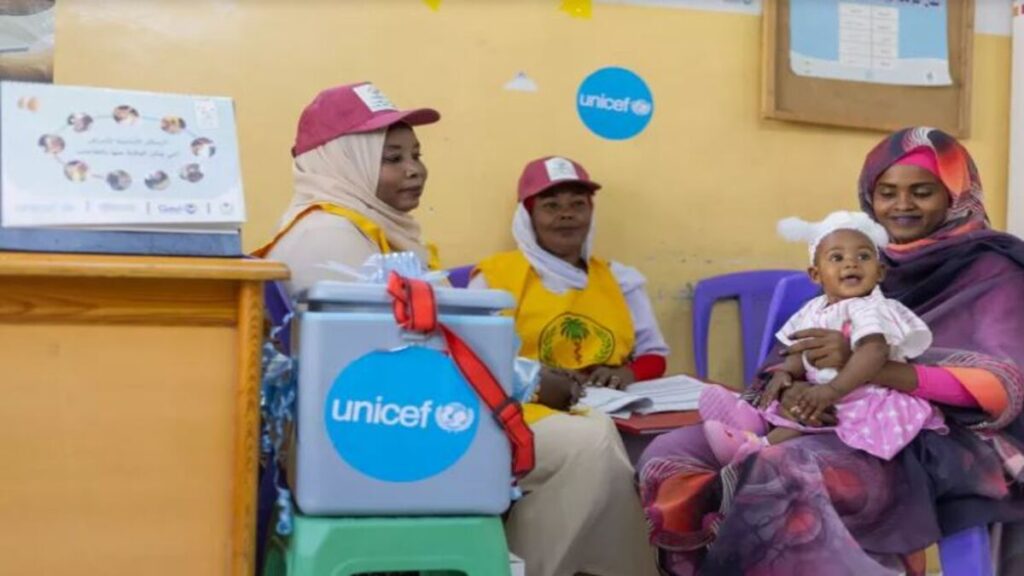Amid ongoing civil strife, Sudan has launched a groundbreaking malaria vaccination programme that aims to shield thousands of children from one of the country’s deadliest diseases.

Sudan has launched its first malaria vaccination campaign amid 18 months of civil conflict, aiming to protect thousands of children from the deadly disease.(Photo: UNICEF Sudan/2024/Elfatih) _caption
The Federal Ministry of Health kicked off the initiative on Monday in partnership with UNICEF, the World Health Organisation (WHO), and Gavi, the Vaccine Alliance. The campaign makes Sudan the first nation in WHO’s Eastern Mediterranean Region to roll out malaria vaccines.
“This vaccine represents a critical new tool in our child mortality fighting toolkit,” said Sheldon Yett, UNICEF Representative to Sudan. The timing is crucial, as Sudan’s healthcare system struggles under the weight of an 18-month civil conflict.
The first phase of the campaign targets over 148,000 children under 12 months old across 15 health facilities in Gedaref and Blue Nile states. Health officials will administer the initial shipment of 186,000 vaccine doses that arrived in October.
The disease’s impact on Sudan has been devastating. Last year alone, malaria claimed an estimated 7,900 lives, though experts believe the actual death toll might be higher due to the ongoing conflict between rival military forces.
Dr. Shible Sahbani, WHO Representative to Sudan, stressed the importance of a comprehensive approach. “WHO continues to advocate for integrated malaria interventions, combining the vaccine with other preventive measures,” he said.
The civil unrest has severely damaged Sudan’s healthcare infrastructure. More than 70 percent of hospitals in conflict zones have stopped operating, while vaccination rates have plummeted from 85 percent before the war to about 50 percent now.
Adding to these challenges, an unprecedented 11 million people have fled their homes, making it harder for healthcare workers to reach vulnerable populations.
Anne Cronin, Senior Country Manager for Sudan at Gavi, highlighted the programme’s significance. “The introduction of the malaria vaccine not only marks a crucial step forward in protecting countless children’s lives but also brings hope for a healthier future despite the current adversity,” she explained.
To ensure the programme’s success, Sudan’s Federal Ministry of Health has developed extensive implementation plans. These include training healthcare workers, engaging with local communities, and strengthening cold chain facilities to maintain vaccine quality.
The vaccination drive will expand significantly over the next two years. Health officials plan to introduce the vaccine in 129 more localities across Sudan in 2025 and 2026, dramatically increasing its reach.
This initiative comes at a critical time when Sudan faces multiple health challenges. Low immunisation coverage has left millions of unvaccinated children vulnerable to preventable but potentially fatal diseases. The country has seen frequent outbreaks of various diseases, including cholera, measles, and polio, alongside malaria.
The malaria vaccine programme offers a ray of hope in this challenging landscape. It demonstrates Sudan’s commitment to protecting its youngest citizens despite the ongoing conflict and healthcare system struggles.
Healthcare workers face significant obstacles in delivering the vaccines. They must navigate through conflict zones, maintain proper storage conditions, and convince families to participate in the programme despite the ongoing instability.
The success of this initiative could serve as a model for other countries in the region facing similar challenges. It shows how international cooperation can help deliver crucial healthcare services even in the most challenging circumstances.
Local community engagement plays a vital role in the programme’s implementation. Health workers are working closely with community leaders to raise awareness about the vaccine’s benefits and address any concerns.
The Federal Ministry of Health emphasises the importance of completing all recommended doses for maximum protection. They have established a monitoring system to track vaccination coverage and ensure children receive their full course of shots.
International support remains crucial for the programme’s success. Organizations like UNICEF, WHO, and Gavi provide not only vaccines but also technical expertise and logistical support.
Looking ahead, health officials hope this vaccination drive will significantly reduce malaria-related deaths among children in Sudan. They plan to closely monitor the programme’s impact and make necessary adjustments to improve its effectiveness.
The initiative represents more than just a vaccination campaign. It symbolises hope for Sudan’s healthcare system and demonstrates the country’s resilience in the face of significant challenges.
For thousands of families across Sudan, this programme offers protection against one of childhood’s most dangerous threats. Despite the ongoing conflict and healthcare challenges, the malaria vaccination campaign marks a significant step forward in Sudan’s fight against preventable diseases.
As the programme rolls out across more regions in the coming years, it has the potential to save thousands of young lives and contribute to building a healthier future for Sudan’s children.



















